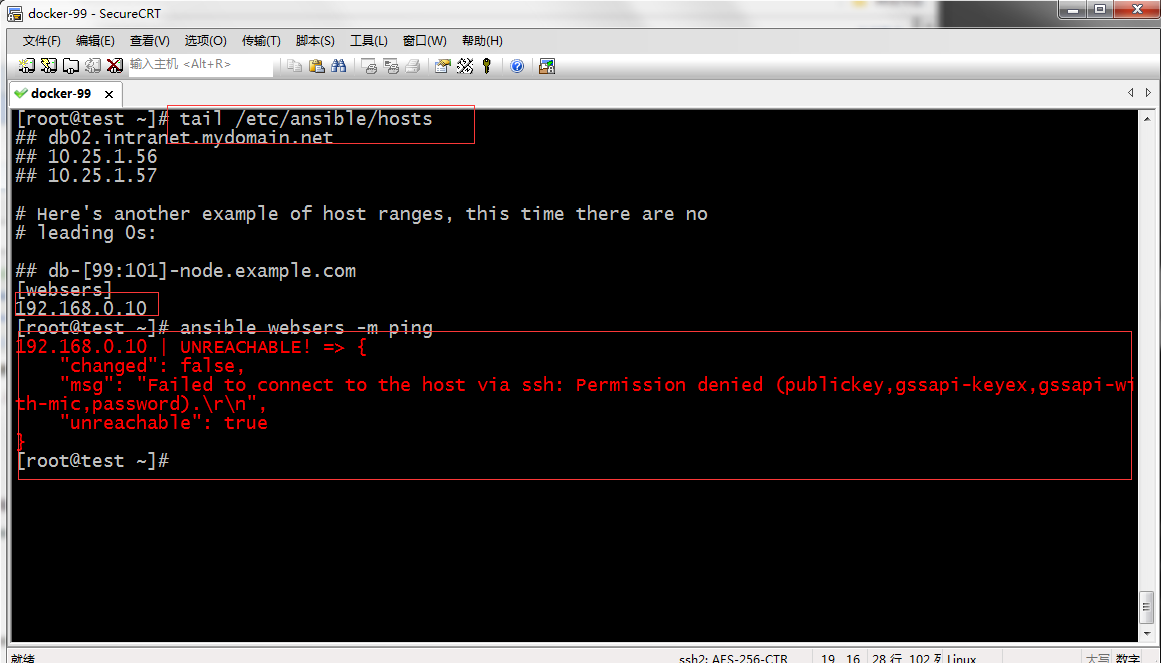您好,登錄后才能下訂單哦!
您好,登錄后才能下訂單哦!
小編給大家分享一下Linux系統如果實現ansible自動化安裝配置httpd,相信大部分人都還不怎么了解,因此分享這篇文章給大家參考一下,希望大家閱讀完這篇文章后大有收獲,下面讓我們一起去了解一下吧!
1、使用ansible的playbook實現自動化安裝httpd
1)首先配置好ansible的hosts文件,讓其對應主機能夠受ansible控制

提示:我們在主機清單上配置了所管控的主機地址,但是直接用ansible的ping模塊去探測主機的存活情況,卻顯示權限拒絕。從提示上說讓我們要指定用什么驗證。默認情況ansible是通過ssh的key驗證的,所以我們在ansible的主機清單中配置了管控主機的ip是不夠的,還要配置ssh基于KEY驗證
2)配置管控主機能夠基于SSH key驗證
[root@test ~]# ip a s enp2s0 2: enp2s0: <BROADCAST,MULTICAST,UP,LOWER_UP> mtu 1500 qdisc pfifo_fast state UP group default qlen 1000 link/ether 00:30:18:51:af:3c brd ff:ff:ff:ff:ff:ff inet 192.168.0.99/24 brd 192.168.0.255 scope global noprefixroute enp2s0 valid_lft forever preferred_lft forever inet 172.16.1.2/16 brd 172.16.255.255 scope global noprefixroute enp2s0:0 valid_lft forever preferred_lft forever inet6 fe80::230:18ff:fe51:af3c/64 scope link valid_lft forever preferred_lft forever [root@test ~]# ssh-keygen Generating public/private rsa key pair. Enter file in which to save the key (/root/.ssh/id_rsa): Created directory '/root/.ssh'. Enter passphrase (empty for no passphrase): Enter same passphrase again: Your identification has been saved in /root/.ssh/id_rsa. Your public key has been saved in /root/.ssh/id_rsa.pub. The key fingerprint is: SHA256:UORxi5JhiKDBOhZP3FsbsZfyCjqUcjwqdl1qcnTyGsw root@test The key's randomart image is: +---[RSA 2048]----+ |+.....oo= . | |.+.o.o B.+.. | |o + *o=o. | |o..... ++ | |.o * + oS. | | = B B . | |.o = E o | |o . = o | | . | +----[SHA256]-----+ [root@test ~]# ssh-copy-id 192.168.0.99 -p 41319 /bin/ssh-copy-id: INFO: Source of key(s) to be installed: "/root/.ssh/id_rsa.pub" The authenticity of host '[192.168.0.99]:41319 ([192.168.0.99]:41319)' can't be established. ECDSA key fingerprint is SHA256:W2pD2PA2K9tGKGVK+weiINcVESkUaHjsTI263OVqBh5. ECDSA key fingerprint is MD5:3a:f8:c9:b1:63:c6:c1:ae:e0:6e:e2:ca:17:4a:20:7a. Are you sure you want to continue connecting (yes/no)? yes /bin/ssh-copy-id: INFO: attempting to log in with the new key(s), to filter out any that are already installed /bin/ssh-copy-id: INFO: 1 key(s) remain to be installed -- if you are prompted now it is to install the new keys root@192.168.0.99's password: Number of key(s) added: 1 Now try logging into the machine, with: "ssh -p '41319' '192.168.0.99'" and check to make sure that only the key(s) you wanted were added. [root@test ~]# scp -r .ssh 192.168.0.10:~/ The authenticity of host '192.168.0.10 (192.168.0.10)' can't be established. ECDSA key fingerprint is SHA256:EG9nua4JJuUeofheXlgQeL9hX5H53JynOqf2vf53mII. ECDSA key fingerprint is MD5:57:83:e6:46:2c:4b:bb:33:13:56:17:f7:fd:76:71:cc. Are you sure you want to continue connecting (yes/no)? yes Warning: Permanently added '192.168.0.10' (ECDSA) to the list of known hosts. root@192.168.0.10's password: id_rsa 100% 1675 677.0KB/s 00:00 id_rsa.pub 100% 391 207.6KB/s 00:00 known_hosts 100% 356 12.2KB/s 00:00 authorized_keys 100% 391 12.6KB/s 00:00 [root@test ~]#
提示:做ssh基于key驗證需要在ansible主機上做,我上面是現在ansible主機上生成一對ssh密鑰,然后通過ssh-copy-id 把公鑰復制給本機生成authorized_keys文件,然后在把.ssh目錄復制給遠端客戶機,這樣一來ansible主機可以通過ssh基于key免密登錄遠端客戶機,同時遠端客戶機也可以通過ssh免密登錄ansible主機,這樣就實現了雙向的ssh基于key驗證,如果你只想單向的通過ssh基于key認證,你可以在ansible主機上生成密鑰對,然后把公鑰發給對方即可。有關ssh基于key認證的詳細說明請參考本人博客https://www.jb51.net/article/180381.htm
測試:用ansible主機通過ssh遠程客戶端主機
[root@test ~]# ssh 192.168.0.10 Last login: Mon Jan 27 04:58:46 2020 from 192.168.0.99 [root@test-centos7-node1 ~]# ip a 1: lo: <LOOPBACK,UP,LOWER_UP> mtu 65536 qdisc noqueue state UNKNOWN qlen 1 link/loopback 00:00:00:00:00:00 brd 00:00:00:00:00:00 inet 127.0.0.1/8 scope host lo valid_lft forever preferred_lft forever inet6 ::1/128 scope host valid_lft forever preferred_lft forever 2: ens33: <BROADCAST,MULTICAST,UP,LOWER_UP> mtu 1500 qdisc pfifo_fast state UP qlen 1000 link/ether 00:0c:29:f2:82:0c brd ff:ff:ff:ff:ff:ff inet 192.168.0.10/24 brd 192.168.0.255 scope global ens33 valid_lft forever preferred_lft forever inet6 fe80::20c:29ff:fef2:820c/64 scope link valid_lft forever preferred_lft forever [root@test-centos7-node1 ~]# exit 登出 Connection to 192.168.0.10 closed. [root@test ~]#
提示:可以看到ansible主機能夠正常免密登錄遠端主機,接下我們在用ansible的ping模塊去探測下被管控主機的存活
提示:能夠看到用ansible的ping模塊去探測遠端主機的存活,返回的狀態是SUCCESS,數據是pong說明對端主機上存活的
到此ansible的環境就準備好了,接下來寫playbook來安裝httpd
[root@test ~]# cat install_httpd.yml --- - hosts: websers remote_user: root tasks: - name: copy epel file copy: src=/etc/yum.repos.d/CentOS-Base.repo dest=/etc/yum.repos.d/CentOS-Base.repo - name: install httpd yum: name=httpd - name: start httpd service: name=httpd state=started enabled=yes [root@test ~]# ansible-playbook -C install_httpd.yml PLAY [websers] *********************************************************************************************************** TASK [copy epel file] **************************************************************************************************** changed: [192.168.0.10] TASK [install httpd] ***************************************************************************************************** changed: [192.168.0.10] TASK [start httpd] ******************************************************************************************************* changed: [192.168.0.10] PLAY RECAP *************************************************************************************************************** 192.168.0.10 : ok=3 changed=3 unreachable=0 failed=0 [root@test ~]#
提示:以上playbook的主要內容是把本機的yum源復制到遠端服務器上,然后通過yum去安裝httpd包,最后啟動httpd;在寫好playbook后,我們用ansible-playbook -C install_httpd.yml 命令對我們寫的playbook進行了測試,沒有問題,接下來我們使用ansible-playbook來安裝httpd
[root@test ~]# ansible-playbook install_httpd.yml PLAY [websers] *********************************************************************************************************** TASK [copy epel file] **************************************************************************************************** changed: [192.168.0.10] TASK [install httpd] ***************************************************************************************************** changed: [192.168.0.10] TASK [start httpd] ******************************************************************************************************* changed: [192.168.0.10] PLAY RECAP *************************************************************************************************************** 192.168.0.10 : ok=3 changed=3 unreachable=0 failed=0 [root@test ~]#
提示:從ansible-playbook 對playbook的執行狀態來看是成功了,接下來我們直接使用瀏覽器來訪問192.168.0.10,看看httpd是否已經能夠正常訪問,如果能正常訪問說明httpd已經安裝好了

提示:可以看到我們用瀏覽器是直接可以訪問到192.168.0.10的測試頁面,說明httpd在192.168.0.10上安裝成功
2、建立httpd服務器,要求提供兩個基于名稱的虛擬主機:
(1)www.X.com,頁面文件目錄為/web/vhosts/x;錯誤日志為/var/log/httpd/x.err,訪問日志為/var/log/httpd/x.access
新建虛擬主機www.X.com的配置文件
[root@test ~]# cat x_com.conf <VirtualHost *:80> ServerName www.X.com DocumentRoot "/web/vhosts/x" <Directory "/web/vhosts/x"> Options None AllowOverride None Require all granted </Directory> ErrorLog "logs/x.err" CustomLog "logs/x.access" combined </VirtualHost> [root@test ~]#
提示:我們在ansible主機上把配置文件建立好,待會直接用ansible把文件推送到對應主機的對應目錄下即可使用
(2)www.Y.com,頁面文件目錄為/web/vhosts/y;錯誤日志為/var/log/httpd/www2.err,訪問日志為/var/log/httpd/y.access
新建虛擬主機www.Y.com的配置文件
[root@test ~]# cat y_com.conf <VirtualHost *:80> ServerName www.Y.com DocumentRoot "/web/vhosts/y" <Directory "/web/vhosts/y"> Options None AllowOverride None Require all granted </Directory> ErrorLog "logs/www2.err" CustomLog "logs/y.access" combined </VirtualHost> [root@test ~]#
(3)為兩個虛擬主機建立各自的主頁文件index.html,內容分別為其對應的主機名
[root@test ~]# cat x_index.html <h2> www.X.com</h2> [root@test ~]# cat y_index.html <h2> www.Y.com</h2> [root@test ~]#
提示:以上文件在ansible主機上準備好了以后,我們接下來寫一個playbook把對應的文件直接推送到遠端主機即可
[root@test ~]# cat set_virtualhost_conf_file.yml
---
- hosts: websers
remote_user: root
tasks:
- name: mkdir virtualhost documentroot directory
shell: mkdir -p /web/vhosts/{x,y}
- name: copy x_com.conf to remotehost
copy: src=/root/x_com.conf dest=/etc/httpd/conf.d/x_com.conf
- name: copy x_com index file
copy: src=/root/x_index.html dest=/web/vhosts/x/index.html
- name: copy y_com.conf to remotehost
copy: src=/root/y_com.conf dest=/etc/httpd/conf.d/y_com.conf
- name: copy y_com index file
copy: src=/root/y_index.html dest=/web/vhosts/y/index.html
[root@test ~]#提示:以上文件的內容主要把我們建立好的配置文件推送到對應主機的對應目錄,接下來我們來檢查下我們寫的playbook是否語法問題
[root@test ~]# ansible-playbook -C set_virtualhost_conf_file.yml PLAY [websers] *********************************************************************************************************** TASK [mkdir virtualhost documentroot directory] ************************************************************************** skipping: [192.168.0.10] TASK [copy x_com.conf to remotehost] ************************************************************************************* changed: [192.168.0.10] TASK [copy x_com index file] ********************************************************************************************* changed: [192.168.0.10] TASK [copy y_com.conf to remotehost] ************************************************************************************* changed: [192.168.0.10] TASK [copy y_com index file] ********************************************************************************************* changed: [192.168.0.10] PLAY RECAP *************************************************************************************************************** 192.168.0.10 : ok=4 changed=4 unreachable=0 failed=0 [root@test ~]#
提示:測試playbook沒有問題,接下來我們來運行playbook,把對應的文件推送到httpd服務器上,然后在服務器上檢查我們寫的配置文件是否正確
[root@test ~]# ansible-playbook set_virtualhost_conf_file.yml PLAY [websers] *********************************************************************************************************** TASK [mkdir virtualhost documentroot directory] ************************************************************************** [WARNING]: Consider using file module with state=directory rather than running mkdir changed: [192.168.0.10] TASK [copy x_com.conf to remotehost] ************************************************************************************* changed: [192.168.0.10] TASK [copy x_com index file] ********************************************************************************************* changed: [192.168.0.10] TASK [copy y_com.conf to remotehost] ************************************************************************************* changed: [192.168.0.10] TASK [copy y_com index file] ********************************************************************************************* changed: [192.168.0.10] PLAY RECAP *************************************************************************************************************** 192.168.0.10 : ok=5 changed=5 unreachable=0 failed=0 [root@test ~]#
提示:從上面的返回狀態看,都是成功的,只是第一個任務提示我們使用file模塊去創建目錄會更好一些,接下來我們使用ansible的shell模塊去檢查遠端服務器上的配置文件的語法是否正確
[root@test ~]# ansible websers -m shell -a 'httpd -t' 192.168.0.10 | SUCCESS | rc=0 >> AH00558: httpd: Could not reliably determine the server's fully qualified domain name, using fe80::20c:29ff:fef2:820c. Set the 'ServerName' directive globally to suppress this message Syntax OK [root@test ~]#
提示:我們利用ansible在遠程主機上檢查httpd的配置文件語法是沒有問題,它提示我們沒有servername,這個提示可以不用管它,如果你覺得非要處理一下也可以,在httpd的主配置文件中找到ServerName 把對應的servername配置上就好了;接下來我們重啟httpd,然后在客戶機上訪問兩個虛擬主機
[root@test ~]# ansible websers -m shell -a 'systemctl restart httpd' 192.168.0.10 | SUCCESS | rc=0 >> [root@test ~]#
在客戶端上更改/etc/hosts文件,讓其訪問www.X.com 和www.Y.com 能夠解析到遠程主機
[root@test ~]# cat /etc/hosts 127.0.0.1 localhost localhost.localdomain localhost4 localhost4.localdomain4 ::1 localhost localhost.localdomain localhost6 localhost6.localdomain6 192.168.0.10 www.X.com www.Y.com [root@test ~]#
測試:利用curl 分別訪問兩個虛擬主機,看看對應的主頁文件內容是否不同
[root@test ~]# curl http://www.X.com/index.html <h2> www.X.com</h2> [root@test ~]# curl http://www.Y.com/index.html <h2> www.Y.com</h2> [root@test ~]#
提示:我們利用curl對其各自虛擬主機的主頁文件訪問,都能看到對應的主頁文件內容,當然你也可以更改Windows的hosts文件,把對應的解析內容寫進去,然后通過Windows瀏覽器也是可以的,如下所示:

提示:在windows上找到hosts文件,然后把對應的記錄添加進去,如下

提示:接下來我們利用Windows的瀏覽器來訪問下兩個虛擬主機


接下我們在看看httpd服務器的日志是否都已生成
[root@test ~]# ansible websers -m shell -a 'ls -l /var/log/httpd' 192.168.0.10 | SUCCESS | rc=0 >> 總用量 16 -rw-r--r--. 1 root root 2668 1月 27 06:30 access_log -rw-r--r--. 1 root root 2940 1月 27 07:34 error_log -rw-r--r--. 1 root root 0 1月 27 07:38 www2.err -rw-r--r--. 1 root root 500 1月 27 07:52 x.access -rw-r--r--. 1 root root 0 1月 27 07:38 x.err -rw-r--r--. 1 root root 500 1月 27 07:52 y.access [root@test ~]# ansible websers -m shell -a 'cat /var/log/httpd/x.access' 192.168.0.10 | SUCCESS | rc=0 >> 192.168.0.99 - - [27/Jan/2020:07:39:15 -0500] "GET /index.html HTTP/1.1" 200 20 "-" "curl/7.29.0" 192.168.0.232 - - [27/Jan/2020:07:52:31 -0500] "GET / HTTP/1.1" 200 20 "-" "Mozilla/5.0 (Windows NT 6.1; WOW64) AppleWebKit/537.36 (KHTML, like Gecko) Chrome/69.0.3497.100 Safari/537.36" 192.168.0.232 - - [27/Jan/2020:07:52:31 -0500] "GET /favicon.ico HTTP/1.1" 404 209 "http://www.x.com/" "Mozilla/5.0 (Windows NT 6.1; WOW64) AppleWebKit/537.36 (KHTML, like Gecko) Chrome/69.0.3497.100 Safari/537.36" [root@test ~]# ansible websers -m shell -a 'cat /var/log/httpd/y.access' 192.168.0.10 | SUCCESS | rc=0 >> 192.168.0.99 - - [27/Jan/2020:07:39:19 -0500] "GET /index.html HTTP/1.1" 200 20 "-" "curl/7.29.0" 192.168.0.232 - - [27/Jan/2020:07:52:48 -0500] "GET / HTTP/1.1" 200 20 "-" "Mozilla/5.0 (Windows NT 6.1; WOW64) AppleWebKit/537.36 (KHTML, like Gecko) Chrome/69.0.3497.100 Safari/537.36" 192.168.0.232 - - [27/Jan/2020:07:52:48 -0500] "GET /favicon.ico HTTP/1.1" 404 209 "http://www.y.com/" "Mozilla/5.0 (Windows NT 6.1; WOW64) AppleWebKit/537.36 (KHTML, like Gecko) Chrome/69.0.3497.100 Safari/537.36" [root@test ~]#
提示:可以看到httpd服務器上都已經生成了對應名稱的日志文件。
Linux是一種免費使用和自由傳播的類UNIX操作系統,是一個基于POSIX的多用戶、多任務、支持多線程和多CPU的操作系統,使用Linux能運行主要的Unix工具軟件、應用程序和網絡協議。
以上是“Linux系統如果實現ansible自動化安裝配置httpd”這篇文章的所有內容,感謝各位的閱讀!相信大家都有了一定的了解,希望分享的內容對大家有所幫助,如果還想學習更多知識,歡迎關注億速云行業資訊頻道!
免責聲明:本站發布的內容(圖片、視頻和文字)以原創、轉載和分享為主,文章觀點不代表本網站立場,如果涉及侵權請聯系站長郵箱:is@yisu.com進行舉報,并提供相關證據,一經查實,將立刻刪除涉嫌侵權內容。